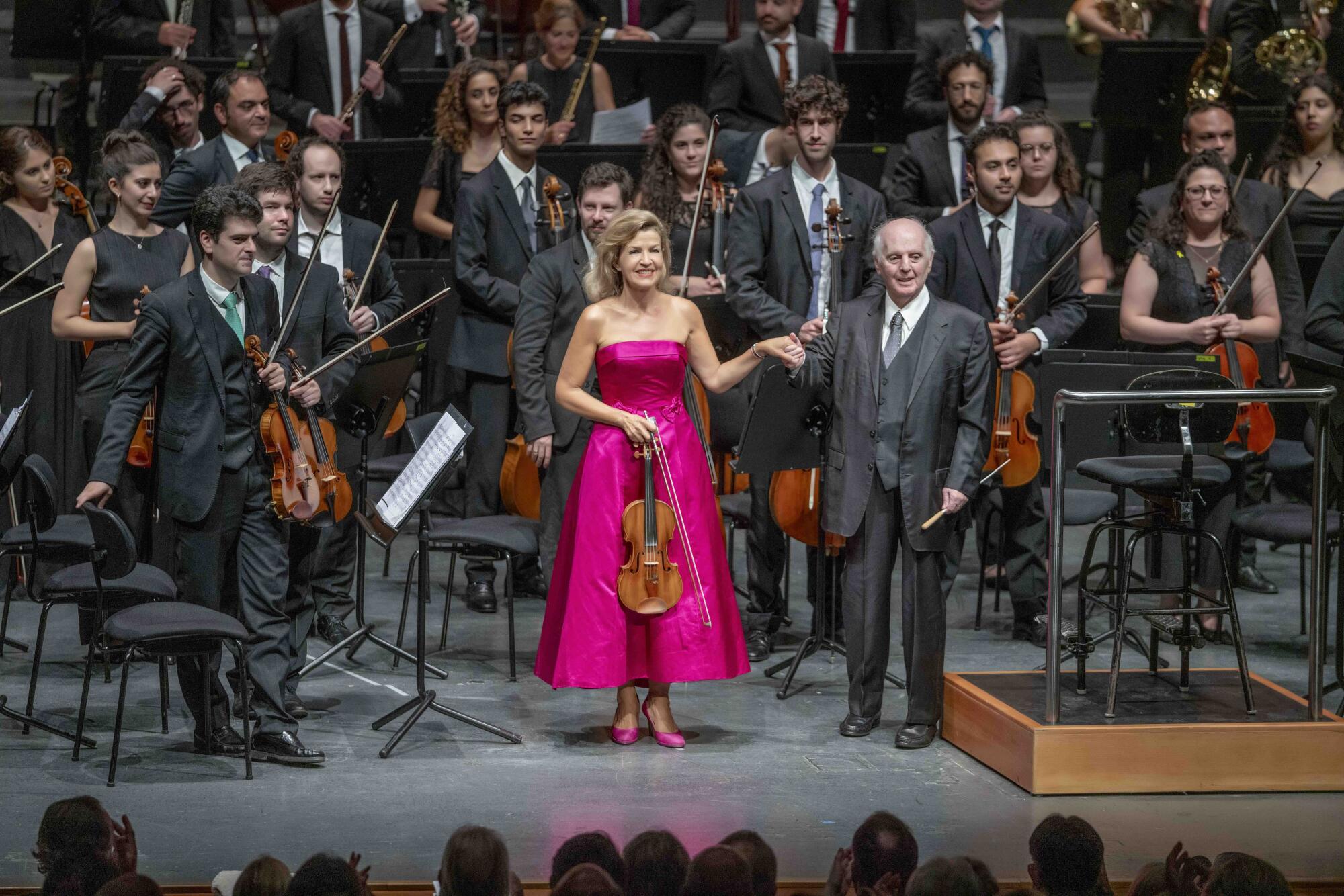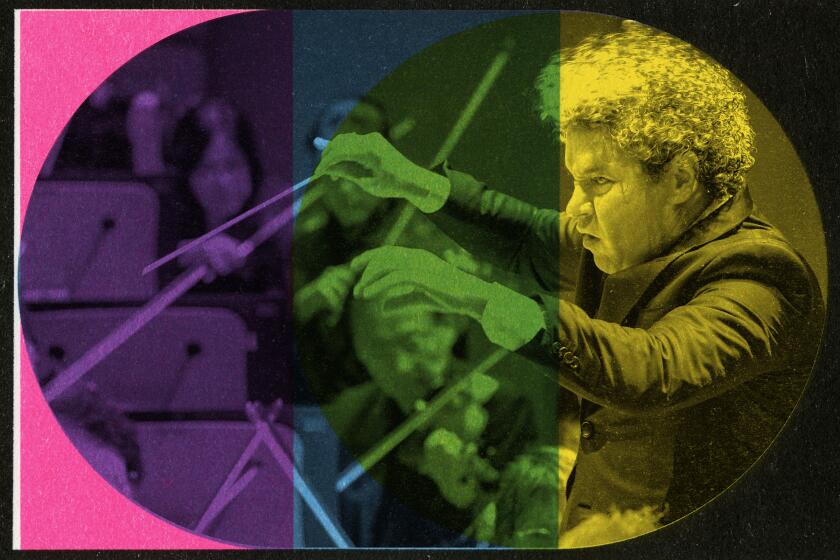
- Share via
- Young musicians with a mission remind us of the true power of music.
- National Children’s Symphony of Venezuela, West-Eastern Divan Orchestra and the Colburn Orchestra lead the way, with help from Gustavo Dudamel, Daniel Barenboim and Esa-Pekka Salonen.
Out of hundreds of symphony concerts I attended or listened to online this year, performances of three symphonies meant the most. Shostakovich’s Fifth, Schubert’s Ninth and Sibelius’ Second may be old chestnuts but not for players who were mostly under 25 and as young as 10.
Any youth or training ensemble has obvious allure. Whatever their level, the young musicians are never indifferent. They keep music alive. Music-making produces happiness, and they aren’t afraid to show it.
These weren’t, however, just any youth or training orchestras. These were orchestras with a big mission.
Gustavo Dudamel and the L.A. Phil’s ‘Das Rheingold.’ The Industry’s ‘Comet/Poppea.’ Pacific Opera Project’s ‘Don Bucefalo.’ The year 2024 delivered great moments for classical music.
In late July, Gustavo Dudamel and the Los Angeles Philharmonic’s YOLA National Festival program hosted an appearance of the National Children’s Symphony of Venezuela, the pride of the country’s vaunted public music education program known as El Sistema. Dudamel had arranged for the orchestra, whose members are 10 to 17, to begin a U.S. tour at Walt Disney Concert Hall. Unlike the formal next stop at Carnegie Hall, where every move Dudamel — as the incoming music director of the New York Philharmonic — makes is scrutinized, this Disney performance was an outright lovefest and, more important, a people-fest.
The concert was free. The audience was full of Youth Orchestra Los Angeles students and kids from nearly every state who were participating in the event, titled “Citizens of the World: An International Youth Festival.” Along with their parents and friends. And the rest of us.

Shostakovich’s Fifth was extraordinary. The players knew the score so well, their eyes remained glued on Dudamel. Their bodies, 180 of them crammed onto the stage risers, seemed glued together. In famous Sistema fashion, they moved as a single organism, exalting in their oneness.
Dudamel led children into the depths of a symphony in which Shostakovich sought a symphonic road map for surviving Joseph Stalin’s political oppression. Well beyond their years, the kids expressed a suffering that doesn’t dispense with beauty. They reveled in their technical and spiritual ability to trumpet triumph over adversity.
What made these young people even more inspiring was that they are from Caracas’ exclusive gated communities as well as from its shocking favelas. These are children of politicians in government and of their opposition. For an hour, Dudamel was their president, and these courageous kids showed us what an idealistic society feels like.

Three weeks later, Daniel Barenboim was taking his West-Eastern Divan Orchestra, made up of young players from Israel and Arab countries, on tour. I caught them at this summer’s Salzburg Festival, where they played Schubert’s last completed and most ambitious symphony, known as “the Great.”
The only performance I can compare to what Barenboim conveyed in this great work would be a recording of a live performance of Schubert’s symphony given by Wilhelm Furtwängler and the Berlin Philharmonic shortly after the end of World War II. Furtwängler seemed to be superhumanly trying to restore not just the culture but the humanity that Germany had disregarded in its horrendous war. The road back for the conductor was in revealing the ultimate goodness and power of art.
The annual L.A. Phil “Noon to Midnight” new-music marathon this year includes Doug Aitken’s immersive “Lightscape,” which proves to be not exactly a crowd-pleaser.
Furtwängler’s conducting has long been a powerful musical inspiration for Barenboim. Another inspiration was the late Palestinian American scholar Edward Said, with whom Barenboim began West-Eastern Divan as an experiment two decades ago. With the war in Gaza and Lebanon, this year proved the most difficult by far for the organization, which also includes an academy in Berlin. Whatever camaraderie the musicians may have discovered could evaporate with a phone call home. On top of that, Barenboim has been suffering from a debilitating neurological disease that has sapped much of his strength.
Yet all of that only created a “Great” greater than any other. The musicians’ devotion to their mentor was palpable in the way they sent energy to Barenboim through their playing. His every weak gesture resulted in a response of incomparable intensity. The performance, for all its forcefulness and sheer brute, was also full of delicacy and individuality. Players, Arab and Jew, listened intently to one another, responded in solos as though part of a personal dialogue — a search for what brings them together, not what keeps them apart.
At the curtain call, they looked exhausted but, yes, happy. They lingered onstage. They hugged. They spoke to one another. It was impossible to tell where they might have come from. They all acted like winners.

Two months later in Disney Hall, Esa-Pekka Salonen conducted the Colburn Orchestra in a fiery yet eloquent performance of Sibelius’ Second Symphony, which was written at the beginning of the 20th century, when Finland was seeking cultural independence from Russia. While the Colburn Conservatory is as highly competitive as the Juilliard School, Curtis Institute of Music, Bard College and other elite music conservatories, all Colburn students receive full scholarships and housing, allowing for a considered national, cultural and economic diversity.
What Salonen got from these gifted players was adrenaline. They didn’t hold back. They didn’t think about reserving their fingers or lips for a performance tomorrow and the next day. They met challenges. Once again here was the best of youth, with a single purpose along with the skill and will to overcome all difficulties.
The San Diego Symphony, one of the country’s rising orchestras, has renovated its formerly inhospitable concert hall with surprising success.
Has it been a good year, 2024? Will 2025 be a little better or even worse? The world is full of worry. Our crises are existential. Death, destruction and despair top the news. Politicians everywhere have emptied words like hope and unity of any meaning.
Dudamel, Barenboim and Salonen are not alone. Hope and unity can be found in youth orchestras with galvanizing conductors around the world. And with the evidence of these three incredible symphony performances in 2024, one word we get to keep for at least a little while longer is utopia.
The biggest entertainment stories
Get our big stories about Hollywood, film, television, music, arts, culture and more right in your inbox as soon as they publish.
You may occasionally receive promotional content from the Los Angeles Times.











